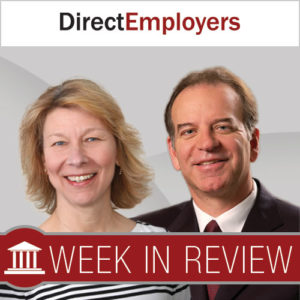The “OFCCP Week in Review” is a simple, fast and direct summary of relevant happenings in the OFCCP regulatory environment published every Friday. Here are this week’s developments:

ALERT! To better align our updates with the regulatory environment, we’re moving the “Week in Review” (WIR) to Mondays starting April 13, 2015. Thank you for your continued support!
March 27, 2015: OFCCP announced that it was extending its current deadline from March 31, 2015 to and through Tuesday April 14, 2015 for members of the public to file comments with OFCCP about its January 30, 2015 Notice of Proposed Rulemaking, the agency’s first ever “Legislative-Type Rules” (i.e. regulations having the binding force and effect of law) regarding “Discrimination on the Basis of Sex” to replace OFCCP’s now 37 year-old Sex Discrimination Guidelines currently published at 41 CFR Section 60-20. The agency unilaterally added these two weeks of additional comment runway in response to complaints from contractors and the Congress that the 60 day comment period the agency had initially provided was too short. Moreover, OFCCP also wanted to give the federal contractor community the opportunity to comment specifically on the pregnancy discrimination law issues the U.S. Supreme Court had addressed only 6 days before the comment deadline. In a major decision breaking new ground on the application of “comparative evidence”, the U.S. Supreme Court handed down on March 25, 2015 its surprise decision in Young v. United Parcel Service. That decision now allows Ms. Young, formerly a pregnant employee, to challenge under Title VII UPS’ denial of a company created “light duty” accommodation program which the Court found UPS extended to other “similarly situated non-pregnant employees”. Ms. Young requested the light duty program because her pregnancy temporarily prevented her from lifting 70 pounds as UPS required. OFCCP’s extension of its Comment period now signals that OFCCP intends to include light duty pregnancy accommodation requirements in some fashion in its Final Sex Discrimination Rule, even before the final contours of this new potential right of light duty programs for pregnant employees gets ironed out in follow-on UPS case decisions. Ms. Young has not won her case at this time, but rather now has the right to proceed to trial to attempt to prove that UPS unlawfully discriminated against her. Specifically, the case now returns to the federal district (trial) court to determine two issues:
(1) which kinds of employees suffering injuries and illnesses and enjoying UPS sponsored “light duty” accommodations were “similarly situated” to Ms. Young and thus which light duty programs may continue without triggering an automatic need to also provide light duty to pregnant employees; and
(2) whether the legitimate non-discriminatory reasons UPS will advance in support of its denial of light duty to Ms. Young were “pretextual” (i.e. false). NOTE: Most employers create light duty programs for those employees injured or made ill on the job as a way to both cut workers compensation costs and to ease the transition of an injured or diseased employee back into the workplace. What makes the UPS case of interest is that the United States Supreme Court cited evidence in the record that UPS ALSO provided “inside” jobs to drivers who had lost their DOT certifications because they (a) failed a medical exam, (b) lost a driver’s license (including as to DUI convictions), and/or (c) were involved in a motor vehicle accident. The Supreme Court was also discovered evidence in the record that suggested UPS may have accommodated any driver who was injured off-the-job (i.e. no workers compensation related cost) and thus could not lift 70 pounds per company requirement.
March 31, 2015: The OFCCP, in their continuing series of webinars on ‘Sexual Orientation and Gender Identity Nondiscrimination Requirements,’ will be discussing how complaints received under Executive Order 11246, as amended by Executive Order 13672 will be processed during two additional webinars. Information presented will include another review of the Final Rule; Complaint Processing and Web Resources you can use for additional assistance. Patrick Patterson, OFCCP Deputy Director and Naomi Levin, Special Assistant to the OFCCP Policy Director, will do two presentations next week from 2:00 p.m. – 3:00 p.m. EST both days. Registration info can be found below:
Wednesday, April 8, 2015
Registration URL: https://dolevents.webex.com/dolevents/onstage/g.php?MTID=ec7d5e565b3dce23fc8efbebe7d537dbd
Thursday, April 9, 2015
Registration URL: https://dolevents.webex.com/dolevents/onstage/g.php?MTID=e0b862c3fc46a40402d0205c2c3ebda57
THIS COLUMN IS MEANT TO ASSIST IN A GENERAL UNDERSTANDING OF THE CURRENT LAW AND PRACTICE RELATING TO OFCCP. IT IS NOT TO BE REGARDED AS LEGAL ADVICE. COMPANIES OR INDIVIDUALS WITH PARTICULAR QUESTIONS SHOULD SEEK ADVICE OF COUNSEL.
Reminder: If you have specific OFCCP compliance questions and/or concerns or wish to offer suggestions about future topics for the OFCCP Fox Report, please contact your membership representative at 866-268-6206 (for DE members), or send an email to Candee Chambers at candee@directemployers.org with your ideas.
- OFCCP Week in Review Special Edition | DEAMcon24 Day Two Recap - April 24, 2024
- OFCCP Week In Review: April 22, 2024 - April 22, 2024
- OFCCP Week in Review: April 15, 2024 - April 15, 2024

